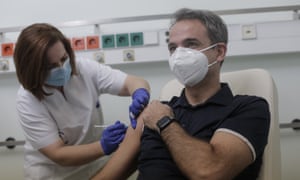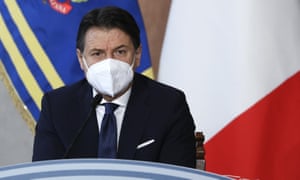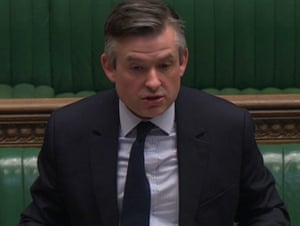
Greece’s government has announced senior officials will no longer be given priority for the vaccine after posts on social media by Cabinet ministers receiving the shot before most healthcare workers led to a backlash from unions and opposition parties.
Aristotelia Peloni, a deputy spokeswoman for the rightwing government, said the vaccination selfies were “wrong” and the plan to vaccinate 126 officials from the government and state-run organisations was being cut short after around half had received the shot.
It had been expected that a small number of senior officials would receive the vaccine publicly, as part of a plan to persuade everyone that it was safe and necessary, but the number of people on the list took many by surprise.
“These [vaccination] selfies were wrong. The symbolism around this issue has been exhausted at the highest level and nothing more was required.” Peloni told Greek radio station Parapolitika.
She said 66 officials had been vaccinated by midday on Wednesday out of a total of 1,128 people who had received the vaccine – meaning politicians received the vaccine before most doctors and healthcare workers.
Greece’s prime minister, president, and the head of the armed forces were all vaccinated at the weekend at the start of a national rollout expected to last months in an effort to ease public concerns over the safety of the programme.
They were followed by opposition party leaders as well as cabinet ministers and other senior government officials – drawing criticism from medical workers’ unions, the Associated Press reported.
“Cabinet ministers and their general secretaries have been lining up for a selfie with the vaccine, while doctors, nurses and other front line workers may have to wait their turn until the end of summer to get vaccinated,” Alexis Tsipras, the leader of the leftwing opposition, said on Tuesday after getting his own vaccine shot.
“That’s not symbolism, it’s favouritism.”

Greece’s prime minister Kyriakos Mitsotakis receives a shot of the first dose of the Pfizer-BioNTech vaccine against coronavirus in Athens on Sunday. Photograph: Anadolu Agency/Getty Images
Updated
at 11.23am EST
UK reports 981 daily Covid-linked deaths
The UK has recorded 981 Covid-related deaths since yesterday, one of the highest daily tolls since April.
The UK also registered 50,023 new cases in the last 24 hours, while 2,430 people were admitted to hospital.
Giuseppe Conte, prime minister of Italy, has said that one of the greatest concerns related to the pandemic facing his government is the plight of workers once a moratorium on firings lifts in March.
Charities have reported a rise in the number of requests from people seeking aid for the first time due to the lockdown in the spring and less severe closures in recent months amid rising coronavirus cases.
Conte defended his government’s actions to protect workers, citing an earmarked €5bn in social funding that the Bank of Italy said had helped to prevent 600,000 people from losing their jobs during the pandemic.
He said the government was working with unions and social services “to confront the very worrying scenarios that we will see after March, because it is clear that the security belt that we have built is more or less working”.

Italian prime minister Giuseppe Conte during the year-end press conference on Wednesday. Photograph: Press office/AGF/REX/Shutterstock
Charities have also noted that some categories of workers remain uncovered by social programmes while government aid last spring arrived late and proved in many cases insufficient to cover basic expenses, the Associated Press reported.
During a wide-ranging end-of-year press conference, Conte maintained his stance that the vaccine against the virus would remain voluntary in Italy. But he urged people to get it. Surveys show one-quarter to one-third of Italians are sceptical of the vaccine.
“I ask everyone to make an effort, put aside ideology, put aside emotional reactions, and let’s perform an act of solidarity, if we don’t want to call it love, toward the entire national community. Let’s take the vaccine,’’ Conte said.
He said the first phase of the vaccination program reaching at least 10 million people should be complete by the end of April, but that there would still be a long way to go in the country of 60 million.
Updated
at 10.51am EST
Good morning, good afternoon and good evening to all, and thanks to Jedidajah. I’ll be bringing you updates for the next couple of hours and you can contact me on Twitter or via email on mattha.busby.freelance@guardian.co.uk if you’d like to get in touch with any news we haven’t yet covered.

Jedidajah Otte
Thanks for following along with me today, I’m now going to hand over to my colleague Mattha Busby.
The British shadow health secretary, Jon Ashworth, said Labour would support the tougher regulations when put to a vote in the Commons on Wednesday.
He told the Commons:
Almost the whole of England is now in a form of lockdown and for my constituents in Leicester, and I’m sure the constituents of MPs from Greater Manchester, will be deeply worried that our areas have now been in a form of restriction for months and months and months. It’s having a huge impact on families and small businesses.
Ashworth questioned if mass lateral flow testing is not enough to contain the spread of coronavirus given Liverpool will move up a tier, also noting: “We will vote for the regulations tonight because the situation we’re in is truly horrific.”
He added the virus is “out of control”, asked for assurances over oxygen supplies for hospitals, and said frontline NHS staff need the “protection of the vaccine ASAP”.

Shadow health secretary Jon Ashworth during the second reading of the coronavirus bill in the Commons on 23 March. Photograph: PA Video/PA
Updated
at 10.48am EST
Steve Rotheram, the metro mayor for the Liverpool City Region, which will be in tier 3 from Thursday, said about the announcement of tougher restrictions for large parts of England:
Despite our area leading on many of the medical developments in the fight against Covid, we have seen transmission rates rise recently in every part of our city region, leading to a worrying uptick in positive cases.
At the same time cases have risen at alarming rates across the rest of the country, threatening to push our NHS to its limits.
Being placed into tier 3 today is something that none of us wanted but I hope that these new measures help to slow down and contain the spread of the virus quickly.”
He promised to support local businesses and called for more government assistance.
We have seen throughout the past 10 months that restrictions can only suppress the virus for a limited period of time.
That’s why I have called on ministers to bring forward plans to rapidly increase the speed of the vaccine rollout, so that we can return to some sort of normality for good at the earliest opportunity.
Updated
at 10.49am EST
Three-quarters of England to move to tier 4 from Thursday
The UK health minister, Matt Hancock, told MP’s on Wednesday that three-quarters of England would be in tier 4 from Thursday, adding that this was “absolutely necessary”.
An additional 20 million people will be in tier 4 of the government’s Covid-19 restrictions from 31 December, meaning a total of 44 million people will be in tier 4, or 78% of the population of England.
Hancock added that 530,000 vaccine doses would be available to the UK from Monday.
He said the Oxford vaccine means the day on which restrictions are lifted can be brought forward.
“It brings forward the day on which we can lift the restrictions that no one in this house wants to see any longer than are absolutely necessary,” he said.
“But we must act to suppress the virus now, not least because the new variant makes the time between now and then even more difficult. And so whilst we have the good news of the vaccine today, we also have to take some difficult decisions.”
The prime minister, Boris Johnson, said on Wednesday that the virus was surging in parts of the country, increasing virtually everywhere. He emphasised that the new variant of coronavirus was making keepings kids in school even more difficult.
“We have to look very hard at what we do with schools,” he said. “We have tough weeks ahead,” Johnson added, after saying the Brexit trade deal with the EU was “cakeist”.
“We have the best of both worlds,” he said.
Updated
at 10.21am EST
This from my colleague Josh Halliday on areas in England that will move to new, higher tiers from Thursday morning.
Josh Halliday
(@JoshHalliday)🚨Excl: Areas being placed into Tier 4 include all of north-east England, Cumbria, Cheshire, Warrington, Greater Manchester, Lancashire, Blackpool and Blackburn with Darwen, most of West Midlands, all East Midlands except Rutland, large parts of South West.
Josh Halliday
(@JoshHalliday)Excl Tier 3: Liverpool, Rutland, all Yorkshire and Humber, Worcestershire, Herefordshire, Shropshire, Telford and Wrekin, large parts of South West including Cornwall.
Nowhere will be in Tier 2. Only Isles of Scilly in Tier 1.
Updated
at 9.57am EST
People in the UK should welcome the new year in their own home and avoid meeting up with family and friends, scientists and police have said, as coronavirus cases in the UK soar and hospitals report growing pressure.
My colleagues Nicola Davis and Vikram Dodd report.
Updated
at 9.56am EST
Latvian police and border guards will patrol the streets to enforce a new year’s night curfew aimed at preventing large crowds gathering as coronavirus infections rise.
The curfew will last through the weekend and also cover the Orthodox Christmas holidays a week later, widely celebrated in the nation of 1.9 million.
More than 2,000 police, reinforced by border guards and the national guard, will patrol streets during the curfew hours, when leaving home will only be permitted for medical emergencies or for work, Reuters reports.

People walk under the Christmas street illuminations in Ogre, Latvia, on 22 December. Photograph: Ints Kalniņš/Reuters
“The curfew will help prevent a total disaster,” president Egils Levits told public radio. He said contacts between people over the Christmas were the reason why Latvia and its Baltic neighbours Estonia and Lithuania reported record numbers of Covid-19 infections on Thursday.
Latvia and Estonia were the 12th and 11th worst-hit countries in the European Union, with around 580 new cases per 100,000 people, over the two weeks ending on Sunday.
Updated
at 9.50am EST
Millions of university, college and school students in England will face delays in returning to in-person classes in the new year, with some undergraduates not returning until February, the government is to announce.
Gavin Williamson, the education secretary, is due to give a statement to parliament on Wednesday afternoon confirming plans including a sharp reduction in the numbers of university students eligible to return to campus in the first weeks of January, and more rigorous testing requirements.
Secondary school pupils will not return to their classrooms in the week beginning 4 January, with most expected to have an extended holiday.
Those taking exams such as A-levels, BTecs and GCSEs will initially have online or remote lessons while schools and colleges carry out mass testing of their students, and return to school from 18 January.
My colleague Richard Adams has more.
Updated
at 9.50am EST
AstraZeneca said on Wednesday it is working efficiently and transparently to bring its vaccine to Brazil as fast as possible, adding that it remains committed to seeking full regulatory approval in Brazil after authorisation in the UK on Wednesday.
In a statement, AstraZeneca said it would keep up the ongoing submission of its late-stage trial results, but made no mention of seeking emergency use approval – a process that Pfizer, who also developed a coronavirus vaccine – has described as cumbersome in Brazil.
Updated
at 9.50am EST
Scotland records highest daily rise in cases
Scotland has recorded 43 deaths from coronavirus and 2,045 positive tests in the past 24 hours, the highest daily case figure on record, Scottish government figures show.
It brings the death toll under this measure – of people who first tested positive for the virus within the previous 28 days – to 4,510, PA Media reports.
The latest statistics show 124,831 people have now tested positive in Scotland, up from 122,786 the previous day. The daily test positivity rate is 11.3%, down from 14.4% on the previous day.
Of the new cases, 618 are in Greater Glasgow and Clyde, 295 in Lanarkshire, and 257 in Lothian. There are 1,133 people in hospital confirmed to have the virus, up 41 in 24 hours. Of these patients, 69 are in intensive care, an increase of four.
Updated
at 9.51am EST
A further 494 people in England who tested positive for Covid-19 have died, bringing the total number of confirmed reported deaths in hospitals to 49,719.
Patients were aged between 30 and 100 years old. All except 20 (aged 36 to 92 years old) had known underlying health conditions, NHS England said, with dates of death ranging from 9 November to 29 December 2020.
The number of deaths of patients with Covid-19 by region are as follows:
East of England – 40
London – 83
Midlands – 94
North East & Yorkshire – 71
North West – 109
South East – 65
South West – 32
Since Tuesday 28 April, NHS England and NHS Improvement also reports the number of patient deaths where there has been no Covid-19 positive test result, but where the disease is documented as a direct or underlying cause of death.
This means the NHS England and NHS Improvement data collection provides information on all Covid related (suspected and confirmed) deaths in England hospitals.
Today, 23 deaths have been reported with no positive Covid-19 test result.
Updated
at 9.55am EST


